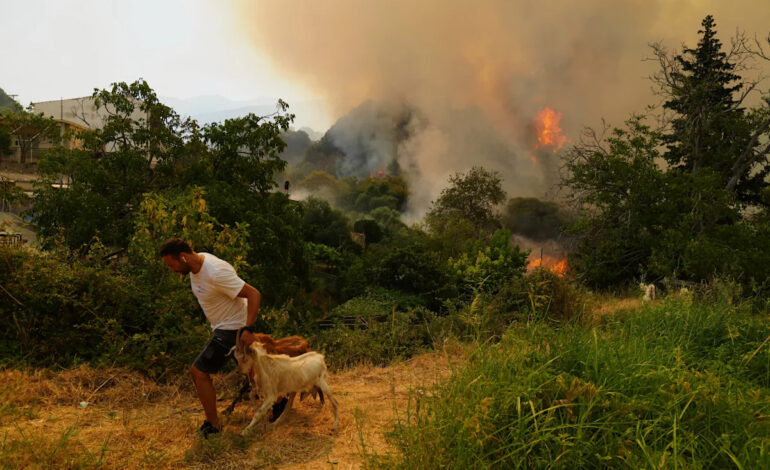Climate Change Intensifies Wildfires in Turkey, Greece, and Cyprus

A recent study highlights the significant role of climate change in exacerbating wildfires across Turkey, Greece, and Cyprus. According to research released by World Weather Attribution on March 14, 2025, the intense fires this summer were driven by soaring temperatures and reduced rainfall, resulting in a catastrophic toll that included 20 fatalities and the evacuation of 80,000 people. The fires ravaged over 1 million hectares (approximately 2.47 million acres), marking Europe’s most severe wildfire season on record.
Wildfires erupted in the eastern Mediterranean during June and July, with temperatures exceeding 40 degrees Celsius (around 104 degrees Fahrenheit) and conditions that were extremely dry, compounded by strong winds. The analysis revealed that these fires were 22% more intense than in previous years, underscoring the alarming impact of climate change on wildfire behavior.
Climate Change’s Impact on Weather Patterns
The research indicates that climate change has significantly altered weather patterns, leading to hotter and drier conditions. “Our study finds an extremely strong climate change signal towards hotter and drier conditions,” stated Theodore Keeping, a researcher at the Centre for Environmental Policy at Imperial College in London. He noted that with a current warming of 1.3 degrees Celsius, the world is witnessing unprecedented extremes in wildfire behavior, which are pushing firefighters to their limits. Keeping warned that without a swift transition away from fossil fuels, the planet could face a temperature increase of up to 3 degrees Celsius this century.
The study also highlighted a notable decline in winter rainfall by about 14% since the pre-industrial era, a period marked by heavy reliance on fossil fuels. Additionally, it was found that climate change has increased the likelihood of prolonged periods of dry, hot air, which now occur 13 times more frequently, creating ideal conditions for wildfires.
Challenges for Firefighters
The analysis pointed to a rise in the intensity of high-pressure systems, which have strengthened the notorious Etesian winds. These winds have historically aided in controlling wildfires, but they are now becoming increasingly unpredictable. Gavriil Xanthopoulos, research director at the Institute of Mediterranean Forest Ecosystems of the Hellenic Agricultural Organization in Greece, noted that firefighters can no longer rely on the winds to subside, making fire management more difficult.
The study underscores the urgent need for further investigation into changing wind patterns and their impact on wildfire dynamics. Flavio Lehner, an assistant professor of Earth and atmospheric sciences at Cornell University, commented that the study’s findings align with existing literature on climate change’s influence on weather patterns conducive to wildfires. He emphasized that climate change is effectively “loading the dice for more bad wildfire seasons” in the Mediterranean.
The implications of this research are profound, as the region faces an increasing threat from wildfires driven by climate change. This study serves as a call to action for governments and organizations to prioritize strategies aimed at mitigating climate change and enhancing wildfire management practices. The time for decisive action is now, as communities in Turkey, Greece, and Cyprus grapple with the devastating effects of more frequent and intense wildfires.






